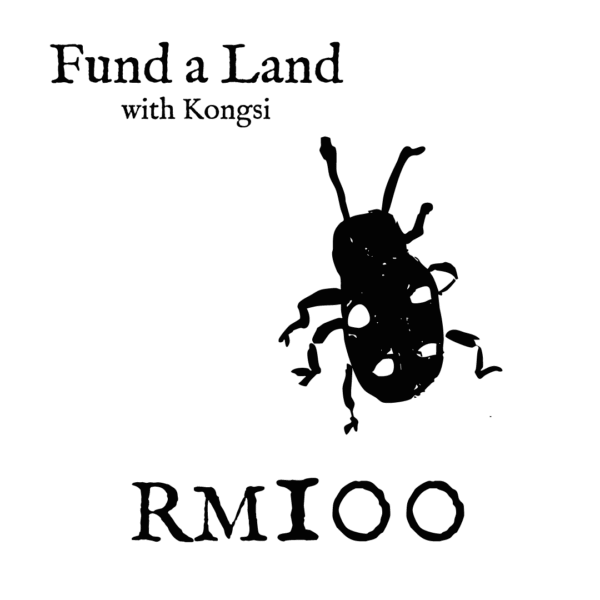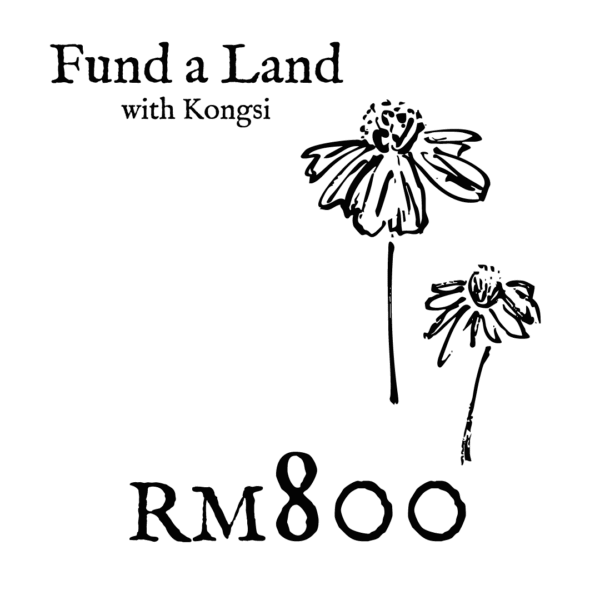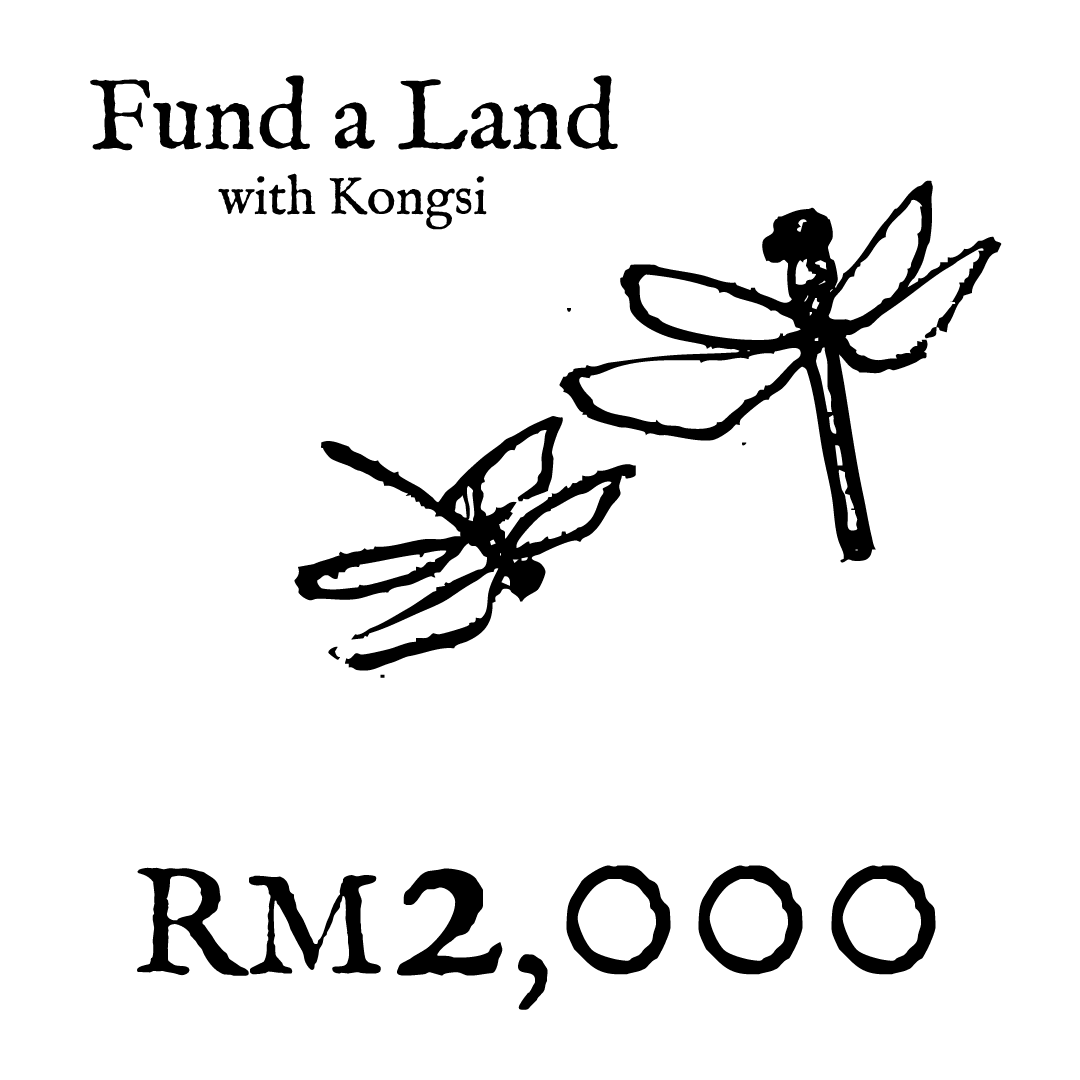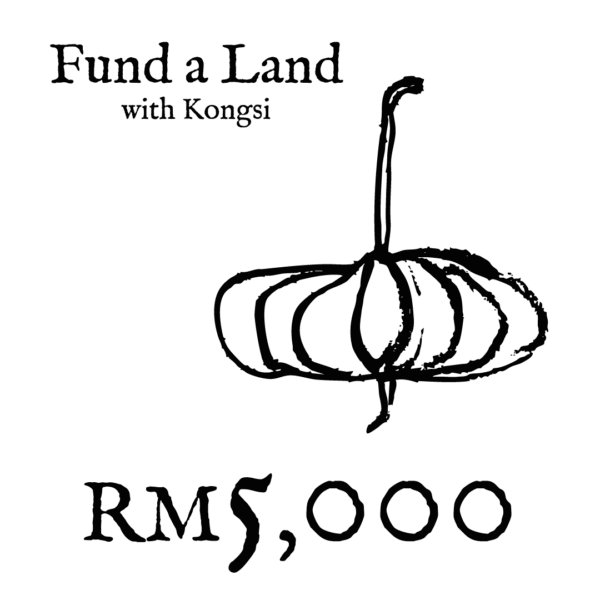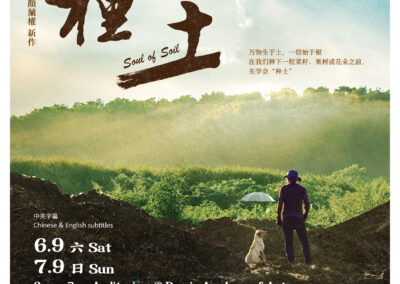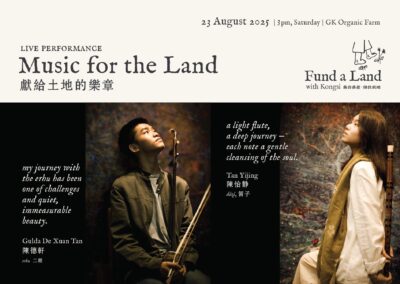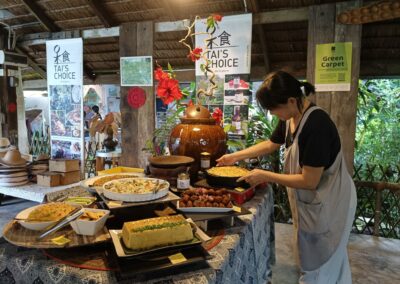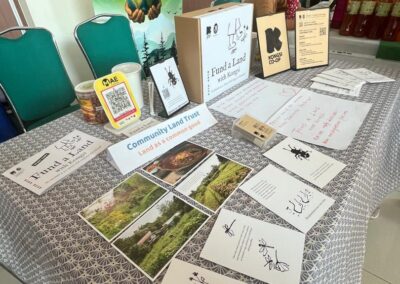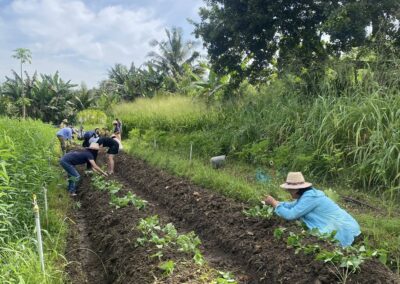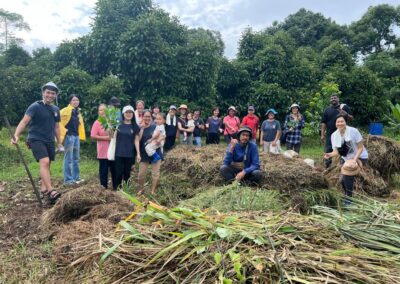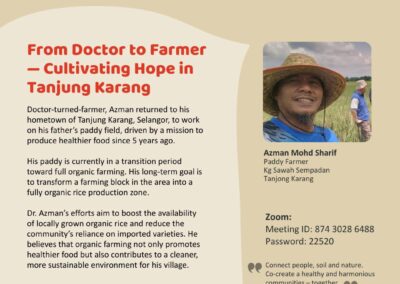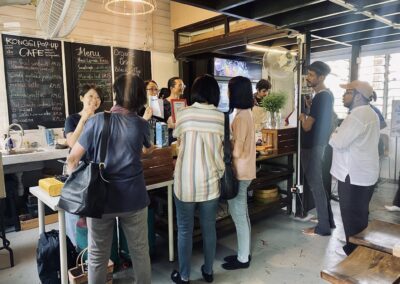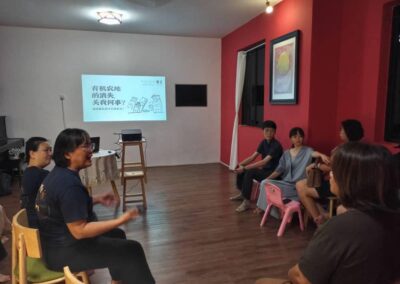
Content (click title for shortcut)
UPDATE (November 7, 2025) We are pleased to announce a strategic milestone: Kongsi Co-op will sign the Sale and Purchase Agreement in the coming weeks, securing the land acquisition.
Since its launch in April 2025, the initiative has raised RM955,304.79 from 293 contributors towards the RM3,650,000 goal. Achieving full payment by the April 2026 deadline will also secure a RM66,000 contribution from the seller.
We now call for your continued support to successfully execute this agreement and establish a sustainable model for community land trust.
Help us raise RM3.65mil by December 31, 2026
Day(s)
:
Hour(s)
:
Minute(s)
:
Second(s)
Collected funds to date: RM 1,001,978.54
10% deposit paid to seller: RM327,373.30
(Updated on 2 February 2026)
- RM3,650,000 27.4%

My Story and Visions for GK Farm
by Callie Tai, Kongsi Co-op co-owner and director
Growing up in a small village in Melaka surrounded by rubber estates with clear rivers full of small fishes, native fruit trees and food producing fields, I always felt a deep connection to the land and the people around me. My childhood was painted with vibrant memories of attending my primary school with 14 classmates from the same kampung, playing in the fields, helping my parents with daily chores in the rubber estate, vegetable fields and at home, observing my grandparents gotong-royong with our kampung community whom we celebrate all festive seasons together. Some of my fondest memories were accompanying my grandfather, who was a penghulu, to government offices to help the kampung folks sort out various issues. My maternal grandmother spent a large part of her life helping at the temple and my paternal grandmother was the cook at all the weddings and funerals in our kampung. My family lived without TV and fridge until I was much older. All the food ingredients were fresh or preserved in a traditional way.
Life in the kampung was simple yet memorable. These, I believe are the experiences that have instilled in me a profound connection to the land and nature; and a reminder of what we have lost in the rush toward modernisation.
In 2001, after quitting my corporate job in Singapore, I joined my family in Justlife, an organic products retailing and distribution business. That was when I became increasingly aware of the impact of modern agricultural practices and our consumption habits on our environment and our health—our once-thriving fields became sandy/hard clay, produce grown is no longer healing us, and conventional farmers are not eating the fruits and vegetables that they grow for sale.
Throughout my over 20 years of involvement in organic business, I had the privilege to visit many farms that practices sustainable farming methods, namely organic farming, biodynamic agriculture, natural farming, permaculture, agroforestry etc.. GK Farm is one of the first organic farms that I have visited when my two children were 4 and 7. Now they are adults but still remember the experience of walking bare feet on the farm.
GK Farm has been a regular supplier of fresh produce to Justlife since the beginning, while also and has always been avidly supporting all the big and small activities that Justlife organised to reach out to the public about organic living.
When I first co-initiated Kongsi Co-op, the owners of GK Farms were among the first to join as co-owners. They became one of our first partners in the Community-Supported-Agriculture (CSA) initiatives at Kongsi Co-op—Kongsi Community Market, Kongsi Food Bag, Kongsi Festive Gifts for 2023 and 2024.
Today, I feel blessed that our family is still having easy access to organic produce from these farms.

Justlife company gathering in 2016

Kongsi Co-op Recycle Day and Market February 2023

In June 2024, I received a phone call from Lee Shyong (A.K.A. Chef Tai), one of the current farm stewards of GK Farm, asking me if Kongsi Co-op can help to buy over the land where the farm is situated as the land owner has indicated the intention to sell the land. The idea of purchasing the land when Kongsi Co-op was still in the early days was daunting but it also ignited a spark within me. I have been aware of the sense of insecurity of GK Farm farmers who are renting the land on a yearly term.
I envisioned a place where we could have many more 30 years of continuing to educate our community about organic farming, have access to healthy foods close to Klang Valley, and foster a sense of unity among the community. This farm would not only provide fresh, chemical-free produce but also serve as a sanctuary for our traditions and values. It would be a space for learning, sharing, and growing—not just crops, but also hope and resilience to the local and wider communities.
Motivated by this vision, the Kongsi team approached the land owner with total honesty and transparency. We were touched by the response from the land owner who supported our intention, giving us until the end of 2025 to raise the fund. Without delay, we started organising donation drive presentations among interested parties to raise funds for the purchase of the land.
As donations began to pour in January 2025 to pay for the 2% earnest deposit, I felt a wave of hope wash over me.
This is more than just a financial campaign; it is a movement towards a healthier, more sustainable future for our children and their children. It is about empowering our community to take charge of our land and our lives. Through this journey, I learned the power of community and the strength that comes from working together towards a common goal. Each contribution brought us closer to our dream of owning GK Organic Farm.
Today, as I am moving on the path of making our dream a reality, I am filled with gratitude. I see that my journey as a kampung girl is coming full circle. I see the potential in building a resilient community, and I am excited about the positive change that lies ahead.
More Than Just an Organic Farm

Located near Bangi, about 40km south of Kuala Lumpur, GK Organic Farm has been growing a variety of vegetables and fruits since 1994. Besides producing their own compost and practising organic and natural farming, the farm has started applying biodynamic agriculture practices under the guidance of Mr Tung Siew Hoe (a.k.a. A Niao) of Centainnel Agriculture Farm for six years now. GK Organic Farm has been offering regular guided farm tours and organic luncheons for 30 years, widely enjoyed by both adults and children.
More than just a farm. For 30 years, GK Organic Farm has been a labour of love, a sanctuary of sustainability, and a testament to the power of working in harmony with nature. What began as a humble dream has blossomed into a thriving legacy, nurtured by the dedication of two generations of farmers who have poured their hearts into every seed planted and every harvest reaped.
More than just growing food, GK Farm stewards are growing connections — to the land, to our community, and to the future. For three decades, the farm is free from synthetic chemicals to ensure that every bite of our produce is as wholesome as it is delicious. The fields are without plastic covers, alive with the buzz of bees and other friendly insects, decorated with colourful edible flowers, a cozy wakaf for activities and the promise of a vibrant tomorrow.
More than just a location, it is a heart-warming story. A story of resilience, of nurturing the soil that nurtures us, and of passing down the wisdom of sustainable farming from one generation to the next. It’s a story of families gathering around tables filled with fresh, organic food, of children learning where their food comes from, and of communities coming together to support a shared vision of health and harmony.
As the farm celebrates 30 years of organic farming, we are also looking at its next 30 years, 60 years and 100 years. We are committed to preserving this land, not just for ourselves, but for generations to come.
Help us achieve this milestone. Whether you are a long-time supporter or new to this story, you are part of what makes GK Farm so special. Together, we can continue to grow a future where the land thrives, communities flourish, and every harvest is a reminder of the love and care that goes into it.

Words From the Farm Stewards
An intended short term stay became my life
shared by Chef Tai Lee Shyong
17 years ago, after leaving my job as a chef on a luxury cruise, I stepped into GK Farm to volunteer for farm work, wanting to see if I could adapt to a rural lifestyle. My original plan was to stay for a few months before moving on to experience different farm lives in other countries. This place was supposed to be just a warm-up spot! But in the end, I never went anywhere else. I stayed at GK Farm until now—you could say I have lived and thrived with GK Farm.
This place is truly a blessed land. Once you come, you never want to leave! Before I arrived, the previous owner, Mr. Gan, had already been cultivating and managing this land for 14 years, laying a strong foundation for the farm’s resources. The planting and production of crops were already quite stable, but the farm was consistently losing money. Mr. Gan was a highly capable man who knew how to live with ease. He said making money didn’t matter to him — he had already achieved the lifestyle he desired.
At the time, I truly admired his relaxed attitude! Later, aside from my longing for an organic lifestyle, one of the biggest reasons I decided to stay was to learn how to live as freely as he did. Not blindly chasing money, but focusing more energy on living life. Doing things simply because you want to, without too many set purposes! That’s why, later, the brand we created at the farm was named “呆食” (daishi)… symbolizing doing things simply and eating simply. Simply don’t think too much! Organic is not just about products, it is a lifestyle.
It is also the original intention behind Mr. Gan’s founding of this farm — to live an organic life, grow organic produce, make organic products, and promote organic principles, to inspire more people to care for the environment and maintain a healthy lifestyle, as well as preserving resources and leaving behind rich productive farmland for future generations.
Even though our capabilities are limited, we remain committed to nurturing and protecting this land, ensuring it remains a place for organic food production. Of course, we also hope that by being here, we can continue to inspire more people to start embracing organic living — just like we did back then!

From left: Chef Tai Lee Shyong, SK, Clement, Mr Liew
Thirty years of cultivating organic soil that planted a way of life
shared by SK
In 2008, I had just stepped away from the corporate world and came to GK Farm as a volunteer. Back then, the farm was run by Mr. Gan, who had been tending to this land for 14 years — yet it was still struggling with continuous financial losses. One day, I couldn’t help but ask Mr. Gan, “After all these years, what have you actually gained?” He just smiled and said, “I’ve gained the life I wanted.” At that moment, I was stunned. Yes, life! Wasn’t that exactly what I had been searching for? And so, I stayed.
In the early days, the farm’s only income came from selling vegetables. When harvests were little, we worried about not making enough to pay wages; when they were abundant, we feared the surplus would rot unsold in the fields. It was an exhausting cycle of anxiety. Eventually, we realised that relying solely on vegetable sales would never sustain the farm. We had to find a more viable way forward. So, we began experimenting with different ways to increase income and reduce waste at the same time. We started preserving surplus produce as jams, pickles, and dried goods to extend shelf life and minimise waste. We also opened the farm for experiential tours and launching farm-to-table organic lunches, attracting families and schools to visit and dine. Over the years, these activities have helped consumers better understand the value of organic farming. Slowly but surely, the farm finally began to break even financially.
Yet, this land has been leased from the land owner on a short term basis. For years, the looming thoughts of “the landlord might sell it one day” hung over us. We somewhat resigned ourselves to the thought that when the land is eventually sold for development, we will just have to step down from this farm that we cherished. However, every time we looked at this land, our hearts ached with reluctance. Thirty years of organic farming had infused this soil with life. We know very well that the soil and the crops grown here carried their own life force. Losing it wouldn’t just mean the end of the GK Farm. It really would mean thirty years of ecological nurturing and the rich soil that was cultivated by so many hands will vanish into nothing.
Thirty years of cultivated organic soil is far too precious! This is not just ordinary soil but the sediment of time, a promise to Mother Nature!
The more we thought about it, the more we felt we had to at least try to do our best to safeguard this land. However, with our limited resources, it felt like a faraway dream. Now, with the presence of Kongsi Co-op, it has given this land a new hope. We sincerely hope that, through the strength of more people coming together, we can permanently safeguard this land that has been producing high-energy food and pass it on to future generations!
As for me, I have finally come to realise what I have truly gained. Now I understand what Mr. Gan said about gaining a life he desired. There are countless ways to make money, but very few that allow you to live in peace. This land has taught me not just how to farm, but how to coexist with nature and how to find my own rhythm in a restless world.
Thirty years of cultivating organic soil — what we planted here isn’t just vegetables, but also our understanding of life, our reverence for the land, and our hope for the future.
25 years of pioneering organic living
shared by Mr Liew
Twenty-five years ago, when “organic” was still an unfamiliar concept, I embarked on this space as a pioneer. For the first thirteen years, I nurtured the seeds of organic living through retail business, witnessing a green awakening on family dining tables across the city. The next eight years rooted me in the soil of a 10-acre GK Organic Farm, where my life ideals blossomed into tangible life cycles — sowing, growing, and harvesting with reverence.
Here, every crop whispers tales of resilience. I witnessed the metamorphosis from an untamed wilderness to a thriving ecosystem and organic food sanctuary. Earthworms till the soil into a living tapestry, while ladybugs and aphids dance in an ecological symphony. We honour natural farming principles, allowing wild grasses and crops to coexist, and letting the land breathe and rejuvenate. While others chase soaring yields, we cherish the quiet miracle of soil organic matter growing by 0.5% each year. We clung to our creed through decades of trials—nurturing depleted soils, adapting to climate change, resisting encroaching urbanization, and navigating shifting land stewardship. We guard the fertile legacy left by those who toiled before us: their calloused hands digging irrigation trenches under a scorching sun, their midnight vigils sheltering tender sprouts from frost. The old saying goes, “One generation plants the trees, the next tends the roots.”
When you taste sun-warmed produce from our fields, you are savoring thirty years of unyielding devotion. This land teaches us that authentic organic living is not just a label, but a rhythm harmonized with nature. Together, let us keep writing humanity’s most heartfelt love letter to the Earth — one season, one harvest, at a time.
An Urban Runaway
shared by Clement
Clement was a graphic designer that rushed through the bustling steel jungle, engaging with customers and computer screens every day. The roads and cars became his office. This life went on for over ten years, until one day, he decided to escape this lifestyle. He wanted to become an organic farmer and live a simple life. He teamed up with two of his friends and began organic farming on 3 acres of rented land in Semenyih. They thought that by taking organic biodynamic agriculture classes and avoiding chemical pesticides and fertilizers would be enough. But after several months of trials and errors, Clement was slapped hard by “reality”. He realised that organic farming is not as easy as they imagined. Without cultivating healthy soil which takes time, there is almost nothing to harvest. Clement quit after 9 months and returned to his corporate job and continued his life in the steel jungle.
Four years ago, Mr. Tai, whom Clement met through a farmer friend, approached him and brought him to GK Farm. Experiences at GK Farm has taught him that true organic farming is not a battle of techniques but a conversation with nature. He knew that this farm is different. The farm experiences not only taught him the importance of soil and the environment, but also to respect the rhythm of the ecosystem.
“If you ask me, what has changed in me here. I would point to my child’s tanned skin and say, this is truly life. If you ask me, what if this land is to be sold? I would calmly say, such a blessed land, it will surely be preserved.” said Clement.

An Overview of the Movement

Kongsi Co-op is proud to present an ambitious and transformative initiative: Fund a Land with Kongsi – to purchase the land currently rented by GK Farm. This is an opportunity to protect a thriving organic farm, ensure food supplies n, and create a sustainable future for our community. By coming together, we can secure this land permanently, preserving it for organic and biodynamic farming while fostering community resilience and environmental stewardship.
A Vision for the Future
Imagine a future where GK Farm thrives as a community-owned space, producing fresh, healthy food for people, soil and nature, at the same time serving as a hub for education and sustainability. Imagine children playing in the fields, elders sharing stories, and families coming together to celebrate the seasons and festivals. This is the future we are working towards — a future rooted in love for the earth and for each other.
Our Mission
To raise RM3.65 million from Kongsi Co-op co-owners and the public to secure GK Farm as a community-owned space for sustainable farming, education, and community resilience.
We aim to collect the amount which includes the legal fees and administration expenses by December 2026 to complete the purchase of 5.85acres* of land.
*See FAQ #15
Memorandum of Information
Click the link below to read the Memorandum of Information for full details.
Fundraising Progress
- RM3,650,000 27.4%
Collected funds to date: RM 1,001,978.54
10% earnest deposit paid to seller: RM327,373.30
(Updated on 2 February 2026)
To illustrate how we can meet the goal, RM3.65million is achievable through the contribution from 730 people at RM5,000 each.
We are deeply thankful for any amount of contribution as it helps us move a step closer towards the goal.
How to contribute?
1. You may contribute any amount as a Kongsi Co-op Co-owner, or purchase a merchandise. To join as co-owner (Malaysians only), please attend a Green Carpet session.
2. For non-Malaysians and individuals who opt for other ways to contribute, you may purchase a curated merchandise of your choice in the amount of RM100, RM800, RM2,000 or RM5,000:-
RM100: Postcard set on GK Farm [Contribute RM100]
RM800: (i) A memoir and recipe book* of GK Farm, (ii) one Kongsi Academy workshop* [Contribute RM800]
RM2,000: (i) A memoir and recipe book* of GK Farm, (ii) an Experiential Activities—A Day at GK Farm, (iii) a curated GK Farm Gift Set and (iv) one Kongsi Academy workshop* [Contribute RM2,000]
RM5,000: (i) A memoir and recipe book* of GK Farm, (ii) 3-month subscription of Kongsi Food Bag (worth RM540), and (iii)two Kongsi Academy workshops* [Contribute RM5,000]
*Remarks:
1. Pre-order: The book is expected to be published by end of 2025. Contributors will receive a copy once it is ready.
2: Kongsi Academy workshop: available for Essential Skill classes worth up to RM300. Contributors can select their preferred classes from available options.
I am ready to contribute as:
More ways to help us achieve this goal
1.Share the Story
Help spread the word about this meaningful movement, talk to friends, family, and neighbors about this cause. Use keywords like Community Land Movement, Fund a Land with Kongsi and tag us @KongsiCoop on your social media postings.
2.Volunteer Your Time
If you have skills or time to offer, join us in organising events, educating others about organic farming, or lending a hand at the farm. Your involvement not only strengthens the community but also brings us closer to our shared goals.
3.Attend Events and Workshops
Come to our fundraising events to show your support. Join workshops or community gatherings by Kongsi Co-op and GK Farm. These events are an opportunity to build connections, share knowledge and celebrate our collective vision for the future. Check out Fund a Land with Kongsi Facebook page for event updates.
4.Join a weekend farm visit and lunch buffet at GK Farm
A popular family-friendly activity, GK Farm offers engaging experience for all ages. Take a guided tour of the farm to learn about organic practices and enjoy a delicious weekend lunch buffet made with fresh, seasonal ingredients straight from the farm. Ideal for city folks looking to escape the hustle and bustle, to connect with nature, and enjoy farm-to-table goodness. By reservation only. Please contact: 012-386 6078 (SK) for enquiries and reservation.
Why This Movement Matters

(i) A Return to Healing Foods
We have witnessed first-hand how modern farming practices have degraded our soil, our food, and our health. By supporting organic farming, we are choosing to nourish our bodies with food that heals rather than harms.
(ii) Environmental Regeneration
Organic or biodynamic and other sustainable farming practices heal the land, rebuild soil health, and sequester carbon. We want to secure this precious land and further expand these practices to far and wide, creating a model for ecological restoration and climate action.
(iii) A Sanctuary for Tradition and Wisdom
GK Farm is a living model of traditional knowledge and sustainable practices, where seniors share their wisdom, and the younger generations learn the value of hard work and respect for the earth. By saving this land, we are preserving a space where these traditions can thrive.
(iv) A Model for Community Resilience
In a world where development often displaces communities and disrupts ecosystems, this movement offers an alternative. It shows that we can come together to protect what matters most—our land, our food, and our shared future.
Impacts of the Initiative
This movement to purchase the GK Farm land has the potential to create significant qualititative and quantitative impacts across environmental, social, economic, and educational dimensions.
(i) Environmental Impacts
- Soil health: Organic farming practices will improve soil fertility, reduce erosion, and increase biodiversity in the soil microbiome.
- Biodiversity: The farm will serve as a sanctuary for native plants, insects, and wildlife, promoting ecological balance.
- Water conservation: Sustainable farming methods will reduce water pollution and improve water retention in the soil.
- Carbon sequestration: Organic and biodynamic farming can help capture and store carbon, mitigating climate change.
- Land preservation: Protecting the farm ensures that 10 acres of agricultural land remain free from development or harmful industrial practices.
- Reduction in chemical use: By avoiding synthetic pesticides and fertilizers, the farm will prevent 1 to 2 tons of chemicals from entering the ecosystem annually.
(ii) Social Impacts
- Community unity: The farm will become a hub for community gatherings, fostering a sense of belonging and shared purpose.
- Cultural preservation: By integrating traditional farming practices and values, the farm will help preserve heirloom seeds, local heritage and knowledge.
- Health and well-being: Easy access to fresh, organic produce will improve the physical and mental health of the community.
- Number of beneficiaries: The farm will directly benefit 150 to 200 families in the community through access to fresh produce, education, and employment opportunities.
(iii) Economic and Food Security Impacts
- Sustainable livelihoods: The farm will create jobs in organic farming, education, and farm management, offering stable and meaningful employment.
- Local economy boost: By selling produce locally, the farm will support the local economy and reduce dependency on imported goods.
- Cost savings: Healthier food options can reduce long-term healthcare costs for the community.
- Produce output: The farm will produce 5 tons of organic fruits, vegetables, and other crops annually, contributing to local food security.
- Food sovereignty: The community will have greater control over its food supply, reducing dependency on external sources.
(iv) Educational Impacts
- Knowledge sharing: The farm will serve as a living classroom, teaching sustainable farming practices, environmental stewardship, and traditional knowledge.
- Skill development: Community members, especially youth, will gain hands-on experience in farming, entrepreneurship, and leadership.
- Awareness raising: Workshops and events will raise awareness about the importance of organic farming, food security, and environmental conservation.
(v) Cultural and Spiritual Impacts
- Reconnection with nature: The farm will provide a space for people to reconnect with the land and traditional ways of life.
- Celebration of heritage: Festivals, workshops, and community events will celebrate local culture and traditions.
(vi) Long-Term Overall Impact
- Model for replication: The success of this initiative can inspire similar community-led land preservation projects across Malaysia and beyond.
- Policy influence: By demonstrating the benefits of sustainable farming, the movement can influence local and national policies to support organic agriculture and land protection.
- Resilience building: The farm will strengthen the community’s resilience to climate change, economic shocks, and food shortages.
Frequently Asked Questions

1. What constitutes a contribution to the Reserve for Land Preservation?
All contributed funds shall be deposited in a dedicated special bank account established solely for the purpose of land preservation. The Contributor acknowledges that all contributions made to the Reserve are entirely voluntary. Contributions are non-refundable and shall not be claimed back under any circumstances.
2. What is my right to the land as a contributor?
The Contributor has no ownership rights over any land acquired using the Reserve but shall have the right to receive updates and ensure compliance with the stated purpose.
3. What is my commitment after my contribution?
There is no specific commitment by the contributors. The Reserve and any acquired land shall be subject to oversight by a special team of volunteer professionals acting as an independent check and balance mechanism.
4. Do I get anything in return for my contribution? What is my relationship with the land?
This is an opportunity to protect a thriving organic farm, ensure food security, and create a sustainable future for our community. By coming together, we can secure this land permanently, preserving it for organic and biodynamic farming while fostering community resilience and environmental stewardship.
Contributors are free to visit the farm or see the impact of their contributions during the open days.
5. I am a non-Malaysian. Can I contribute?
Although non-Malaysians are unable to join as Kongsi Co-op co-owner as stipulated by Suruhanjaya Koperasi Malaysia (SKM) ruling, you are welcome to contribute to this cause by purchasing the specially curated Community Land Movement merchandise.
6. Do you earn interest income with the contribution?
The funds shall be placed under fixed deposit to accumulate interest until a sufficient amount is reached for land acquisition.
7. What will happen to the excess money collected?
Any excess reserve beyond the required amount for the land purchase shall continue accumulating towards future land acquisitions for the same purpose of land preservation.
8. What would happen if the land is sold after Kongsi Co-op bought it?
The acquired land is meant to be preserved perpetually and shall be placed under a Community Land Trust to ensure its protection and the fulfillment of its intended purpose for organic farming.
9. Do I get tax-exemption from contributing?
Kongsi Co-op is not a tax-exempt entity hence there will be no tax exemption for contributors.
10. What is the minimum and maximum amount to contribute? Can I contribute as little as RM1?
Only co-owners (members) of the Kongsi Co-op are permitted to contribute to the Reserve for Land Preservation Account; no external public contributions will be accepted.
To join as Kongsi Co-op co-owner, the minimum capital contribution is RM1,000 plus a one-time entrance fee of RM100. Anyone who are Malaysians older than 18 who have an address in Selangor and Kuala Lumpur can join Kongsi Co-op as co-owner after attending “Green Carpet – an introduction to Kongsi Co-op”.
This is a community initiative and our intention is to gather as many like-minded contributors as we can. Any amount of contributions are welcome.
Alternatively, contributors can opt for purchasing merchandise or join activities which contribute to the land acquisition movement.
11. Can I pay by periodic instalment?
Yes.
12. Can my money contributed be refunded?
Contributions are non-refundable and shall not be claimed back under any circumstances.
13. What happens when the current farmer retires? What will happen when the farm stops operating?
Succession planning for organic farms is crucial to ensure the long term sustainability of the operation. It is the intention of the current farmers of GK Farm and Kongsi Co-op to initiate an apprenticeship and incubation program for new aspiring farmers under the guidance of experienced and dedicated farmers.
14. Who manages the land? Can I trust Kongsi Co-op?
All contributors to the Reserve for Land Preservation are to be the Kongsi Co-op co-owners. Kongsi Co-op is a consumer-owned for-purpose enterprise.
(a) The Reserve and any acquired land shall be subject to oversight by a special team of volunteer professionals acting as an independent check and balance mechanism.
(b) The Board shall maintain transparency in financial reporting and decision-making regarding the Reserve.
(c) Financial statements and records must be kept up to date at all times.
(d) The financial statements of the Reserve shall be audited annually by an independent auditor.
(e) The audited financial statements and reports shall be presented during the Annual General Meeting (AGM) for transparency and accountability.
15. The total land size of GK Farm is 10+ acres. Why is this “Fund a Land with Kongsi” movement only for 5.8 acres?
GK Farm operates on two separate land parcels on rental basis: Lot 7141 (5.8 acres) and Lot 7142 (4.7 acres), each with its own title. Our agreement with the landowner allows us to:
1. Purchase the smaller plot – Lot 7142 upfront.
2. Retain the right to fundraise for Lot 7141 by the end of 2025 – This gives our community time to collectively raise funds for the second plot. From the initial generous contributions from co-owners and community, Kongsi Co-op has paid a 2% earnest deposit to secure the option to purchase Lot 7141.
We are incredibly grateful to Mr. Carlson Yap, a Kongsi Co-op co-owner who has generously purchased Lot 7142 outright, allowing Kongsi Co-op and GK Farm to continue operations on this land rent-free. The current “Fund a Land with Kongsi” campaign focuses on securing Lot 7141 (5.8 acres), ensuring we preserve this vital piece of farmland for community stewardship.
—–
Thank you for taking the time to read through this section in finding answers to your questions. Should you need further clarifications, please send it to Zoe via WhatsApp.
Legal and Professional Advisors

Surina Suhaimi
Advisor to the Board of Directors of Kongsi Co-op on legal affairs affecting the consumer co-operative
- Member of the Malaysian Bar 1995 -2015
- Fellow of the Chartered Institute of Arbitrators since 2007
- Member and Past President of the Rotary Club of Temerloh year 2000 -2017
- Member of the Malaysian Branch of Royal Asiatic Society since 2009
- Secretary of Hillforest Sustainability Society 2020-2021
- Chapter leader of Trash Hero Malaysia, Temerloh Chapter 2019-2021
- Chapter Leader of Trash Hero Malaysia, Janda Baik Chapter 2021-2025
- Member of Malaysian Nature Society (Pahang Branch) since 2020
- Legal Advisor of Kongsi Co-op (Koperasi Kongsi Selangor Berhad, Malaysia) 2022 – present
- Secretary of Didik Alam Society, Malaysia 2022-present

Tan Yiing Fung
LLB (Hons) Leeds, CLP
CY Poon & CM Lim
Yiing Fung began her career with Messrs. Teh & Lee as an Associate in 2012. During her tenure at Messrs. Teh & Lee, her main areas of practice consist of corporate and commercial laws where she was engaged in equity and debt transactions such as mergers and acquisitions, joint ventures, corporate restructuring, takeovers as well as private debt securities, corporate loans and private funds transactions. She left Messrs. Teh & Lee in March 2021 and joined Messrs. CY Poon 7 CM Lim as a Partner. Currently, she is overseeing the business operation of the firm’s branch office in Kuala Lumpur and her main areas of practice consists of corporate, conveyancing and banking specialising in equity and debt capital market and advising on setting up private equity funds.

Tang Kae Sue
Trust Officer, Owner, Director
Hans Advisory and Trust Co Ltd, Labuan
- Graduated from Faculty of Accountancy, University Malaya
- Registered Chartered Accountant
- Members of MICPA and MIA. Affiliate Member of MAISCA
- Licensed Trust Officer in Labuan.
- Previously with PricewaterhouseCoopers
- Previously actively engaged in IPO, merger & acquisition and corporate restructuring projects in Malaysia, Hong Kong & China.
- Received awards :
- 2020 AACSB Influential Leader International Award;
- 2004 The Most Outstanding Young CPA Awards (MICPA)
- 2001 The Most Outstanding Youth Award
“No amount of money will bring back the land that has been organically cultivated for over 30 years!” –Ivan Ho, farmer
The Kongsi Co-op Community Land Movement is more than a campaign—it’s a commitment to a healthier, more equitable, and sustainable future. By purchasing the land for GK Farm, we are investing in our community, our environment, and generations to come.
Let’s grow this vision together for years to come.
Click a button below to contribute as:

Activities
Follow us on instagram and facebook for Fund a Land activities update.
Check out Kongsi Ideas on our Youtube Channel.



